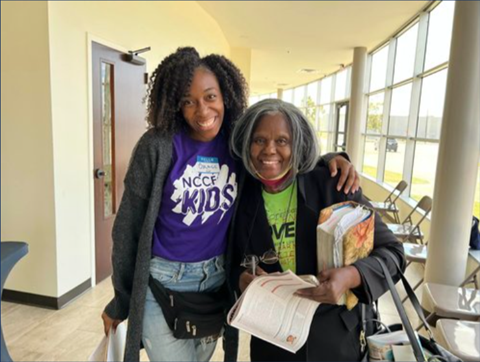
Related Stories
Digital Equity Champions for All Learners: Black Churches 4 Digital Equity Uplifts Role of Faith-Based Institutions in Closing the Digital Divide
Black Churches 4 Digital Equity (BC4DE) is an initiative of the Multicultural Media, Telecom and Internet Council (MMTC), a public interest organization promoting equal access and representation in technology, media, and telecommunications. This coalition, launched in May 2021, partners with faith-based institutions from various denominations across the country to educate members about broadband assistance programs and digital skills, train and organize leaders to advance digital inclusion, and advocate for a permanent broadband assistance benefit for low-income Americans.
BC4DE sees churches as critical partners in the effort to close the digital divide for Black communities. Dr. Fallon Wilson, vice president of policy at MMTC, explained, “Community anchor institutions… [include] faith-based institutions too. They are mosques, they are temples, they are churches… They have locations, people, access, and trust.”
Taking a holistic, community-oriented approach and leveraging their role as trusted messengers, BC4DE partners design initiatives to advance digital inclusion within a welcoming, family-centered atmosphere and connect digital access with other needs and interests. For example, BC4DE partner churches have paired their Affordable Connectivity Program (ACP) enrollment efforts with back-to-school events, food drives, and health fairs. A Detroit-based partner also hosted a jazz festival in conjunction with BC4DE’s ACP Day of Enrollment, bringing the community together through music while signing people up for the benefit.
Pamela Price is a BC4DE fellow and deputy director of The Balm in Gilead, a BC4DE partner building capacity for Black faith-based institutions across the South. During the pandemic, the organization moved its services online and found that many individuals – especially those in rural areas – did not have a reliable, high-speed connection or a device capable of supporting meaningful engagement. In addition, community members had many questions about how to use technology, as well as concerns about how information shared online is used and protected.
The Balm in Gilead has developed the people power necessary to bridge the digital divide, hiring state managers, program coordinators, and health ministry workers to organize ACP enrollment events and assist families navigate the process. Price reflected, “We’re coming to break bread… and then building with [communities] to address the issues and challenges that they’re facing. And that’s where the culturally proficient lens is so important… That fellowship allows me to pour into you the information and resources and tools, and now you see the value of it.”
In addition, BC4DE is working with seminaries at Historically Black Colleges and Universities to train faith leaders around digital equity.
BC4DE has seen the impact of their efforts. For example, The Balm in Gilead hosted 22 ACP Enrollment Day events across six states in 2022, reaching about 50 to 75 families on each occasion. One attendee shared how access to the internet and a device has enabled her to return to school – a long-held goal. “Being able to provide [Black individuals] the connectivity and the access to digital skills, we’re also changing our issues that we have around poverty… [and] education,” Price shared. “Our communities are telling us, ‘If I can get good access to internet… I can use this to better myself and to better my family and to ultimately better my community.’” BC4DE will work with partners in 30 cities across 13 states to host ACP Day of Enrollment activities in August and September 2023.
When asked for what advice they would give state digital equity planners about closing the digital divide for Black communities, Price and Dr. Wilson responded:
- Digital equity plans must be reflective of their communities served – states must ensure that listening sessions and task forces have representatives from those communities.
- States can leverage the trusted relationships that faith-based institutions have with communities to seek participation and input from members.
- Digital equity planners must engage with communities in a meaningful, intentional, and long-term relational way. They must ask communities what they know, what they want for themselves, and how they would address the challenges they face.


